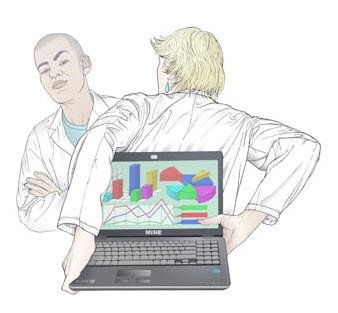This post also appears as a featured article on artsmarketing.org, hosted by Americans for the Arts.

I recently had the privilege of facilitating a roundtable discussion in New York City focusing on issues related to data sharing among arts organizations. As Tiffany Bradley, Development and Marketing Specialist for Fractured Atlas, recently wrote:
As more organizations lead collaborative efforts, the implications of sharing data come to the forefront. Data sharing – whether for marketing, ticketing, fundraising purposes – raises a host of issues. Does pooling information about patrons lead to greater revenues for all parties? Or do organizations risk a negative response from patrons?
Hosted by Fractured Atlas as part of their “Issue Brunch “series and streamed live on the Internet via Ustream, the conversation featured the thoughts and voices of six arts professionals working with arts organizations, including NAMPRadio’s Maris Smith. While the roundtable covered a lot of ground surrounding the benefits and challenges of sharing data between arts organizations, the issue of trust emerged as the bonding force at the heart of all data sharing relationships.
Let’s face it. The idea of giving our data to someone else is anxiety-producing for most organizations. How do we know that they will abide by our agreement and use the data ethically? Yet, if we never place our trust in others, thereby initiating the relationship-building process, then we will never reap the benefits that may come from a data sharing relationship.
Now before someone out there becomes paralyzed with data sharing anxiety, relax. You already engage in data sharing relationships based upon trust. For example, many of us utilize Google Analytics to track visitor interactions with our websites. When we agreed to use Google’s service, we also agreed to share our data with Google. We acquiesce that Google will use our data to contribute to the web traffic data they have aggregated over time and for particular types of websites. However, we trust that Google will never give our websites’ specific data to anyone else without our permission.
Okay, I can hear some of you out there saying, “But that is an example from a service provider; it’s different to talk about sharing data with another arts organization.” No, it’s not. Data sharing relationships between arts organizations should have clearly articulated agreements detailing the data to be shared, the limits of what may be done with that data, and what contributors of the data will receive in return. Yes, these should be written agreements – or at least electronic agreements executed with digital signatures.
And just in case you skimmed over the last item of things to be detailed in data sharing relationships, I’ll rephrase myself. Data contributors should receive something in return for contributing their data. We are talking about data sharing relationships, not data giving relationships. Now, the quid pro quo of a data sharing agreement may simply be that the data collecting organization will provide contributors with overall or customized reports. That’s fine as long as the data contributors have a clear understanding of what they will receive in exchange for adding their data to the larger pool. Far too often, organizations may feel pressured to participate in data collection initiatives and surveys. One of the most important ways that you can maximize your data sharing relationships is to make certain that it is mutually understood by all parties what you will be receiving as a result of contributing your data.
While trust must be given, it must also be earned and respected in order for any data sharing relationship to grow. For example, Elliott Marketing Group has been working on two data sharing projects with numerous arts organizations in Pittsburgh, PA. In 2004, they worked with the Pittsburgh Cultural Trust to establish the SmArt database linking patron files for arts organizations in the city’s downtown cultural district for targeted marketing campaigns. In 2007, they partnered with the Greater Pittsburgh Arts Council to launch the STAR Direct Marketing Database, which allows smaller and mid-sized arts organizations in the Pittsburgh region to pool their patron data and utilize consulting services as well as “best prospect” lists for more efficient, targeted promotions.
The success of these data sharing programs did not happen overnight. The arts service organizations, the organizations contributing data, and the marketing group have spent years developing trust relationships with each other. Now, they have years of collaborative data, and the participating organizations clearly understand what they must contribute to the project and what they will receive in return. With each successive year, the data deepens. Correspondingly, the level of trust each of the contributing organizations has with the arts service organizations and the marketing group also deepens.
A final note on trust in data sharing relationships – don’t break it. Once trust is broken in any relationship, it rarely, if ever, regains its previous depths. For many of us, our data is a precious resource not to be taken lightly. So when a partner breaks our trust with them, our instinct is to take our data and end the relationship. When you negotiate the agreements for your data sharing relationships, always be certain to include an exit clause.
As I mentioned at the top of the article, the issue of trust is just one of many areas that we discussed during the roundtable on data sharing. To learn more about the roundtable, check out the preview video below or view the full discussion at Fractured U.






 Our friends at
Our friends at